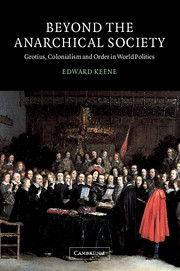Book contents
- Frontmatter
- Contents
- Preface
- Acknowledgements
- Introduction
- 1 The orthodox theory of order in world politics
- 2 The Grotian theory of the law of nations
- 3 Colonialism, imperialism and extra-European international politics
- 4 Two patterns of order in modern world politics: toleration and civilization
- 5 Order in contemporary world politics, global but divided
- Conclusion
- Bibliography
- Index
2 - The Grotian theory of the law of nations
Published online by Cambridge University Press: 22 September 2009
- Frontmatter
- Contents
- Preface
- Acknowledgements
- Introduction
- 1 The orthodox theory of order in world politics
- 2 The Grotian theory of the law of nations
- 3 Colonialism, imperialism and extra-European international politics
- 4 Two patterns of order in modern world politics: toleration and civilization
- 5 Order in contemporary world politics, global but divided
- Conclusion
- Bibliography
- Index
Summary
Among theorists of international relations today, Hugo Grotius is more famous for having defended the existence of an international society than for any substantive propositions he made about what it looks like or how it operates. As I explained in chapter 1, a major reason for this attitude is the way in which the ‘Grotian tradition’ has come to be understood in the context of Martin Wight's ‘international theory’ and Hedley Bull's reflections on the Grotian conception of international society. Over the last thirty years or so, the historical analysis of Grotianism by theorists of international relations has moved away from debates about the sources, content and scope of international law within a societas gentium, and has instead concentrated on debates about the nature of international politics within a states-system. Consequently, the Grotian position is now normally juxtaposed against two alternative political theories of international relations: Machiavellian or Hobbesian realism, and Kantian cosmopolitanism. This leads to the popular view that the most important distinguishing feature of Grotianism is its commitment to the idea of a society of states, in contradistinction to the Hobbesian denial of such a society and the Kantian insistence on a world community of humankind. According to the defenders of contemporary ‘Grotianism’, this offers a valuable way of thinking about international politics because it is more sensitive to questions about world justice than the realists, while at the same time being more sensitive to the problems of anarchy and pluralism than the cosmopolitans.
- Type
- Chapter
- Information
- Beyond the Anarchical SocietyGrotius, Colonialism and Order in World Politics, pp. 40 - 59Publisher: Cambridge University PressPrint publication year: 2002

